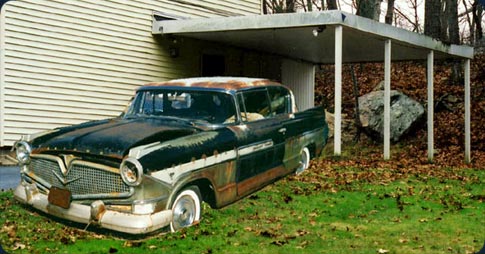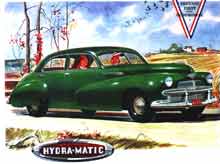Peace Dividend
World War II began to affect 1942 U.S. passenger cars even before the order came to suspend production by February. In October 1941, the War Production Board forbade the use of bright trim on other than bumpers and bumper guards. Plated parts could be used if painted over; Oldsmobile had perhaps the only ad showing a so-called "blackout car."
In contrast to Ford Motor Company and Chrysler Corporation, whose pre- and postwar cars we contemplated last week, the independent manufacturers didn't change their products much for 1946. Hudson, whose 1942 models adopted the industry trend for light, horizontal grilles, also followed fashion with a bolder, more complex style for 1946, but little else on the cars changed. Nash's postwar grille was bolder than the prewar item, but gave a better balanced effect, as the upper grille on the '42 looked a bit snooty. Packard changed hardly at all, making the delicate grille bars on the '42 marginally "stronger" for '46. And Studebaker offered only a continuation of the Champion model for four months until the all-new '47 cars were ready. Though austere, the carryover Champion was all but indistinguishable from the 1942 cars, whose upper-class models were attractively trimmed. The fact that the independents were working hard on all-new postwar cars probably accounts for their lack of effort to facelift the stopgap cars offered for 1946. Willys, on the other hand, dropped production of regular passenger cars until 1952.
The General Motors cars, however, were a mixed bag, many makes being exceptions to the similar-but-bolder-and-more-complex school. Chevrolet's 1946 grille was actually a bit simpler than 42's. Cadillac gave its 1946 grille bigger rectangles and reshaped lights from 1942's. Buick made minimal changes from 1942, adding just a horizontal vent at the top of the grille and emboldening the bars. Pontiac, whose 1942 face was a real mix of sizes and shapes, simplified the front of its 1946 cars, and Oldsmobile, whose '42 grille was truly bizarre (the middle bar was actually part of the bumper), also cleaned up its grille for '46, although the car had a permanent frown.
Perhaps we shall never know what the 1943 cars would have looked like, had there been such models. The 1946 facelifts were likely quick jobs, undertaken in a hurry when most of the styling effort was going into all-new 1947s, '48s and '49s. For posterity's sake, though, I wish there had been more '42s.

